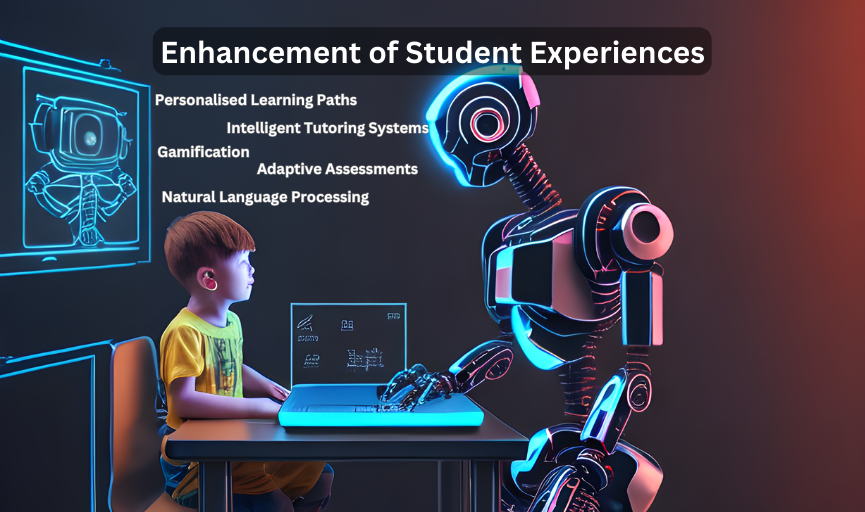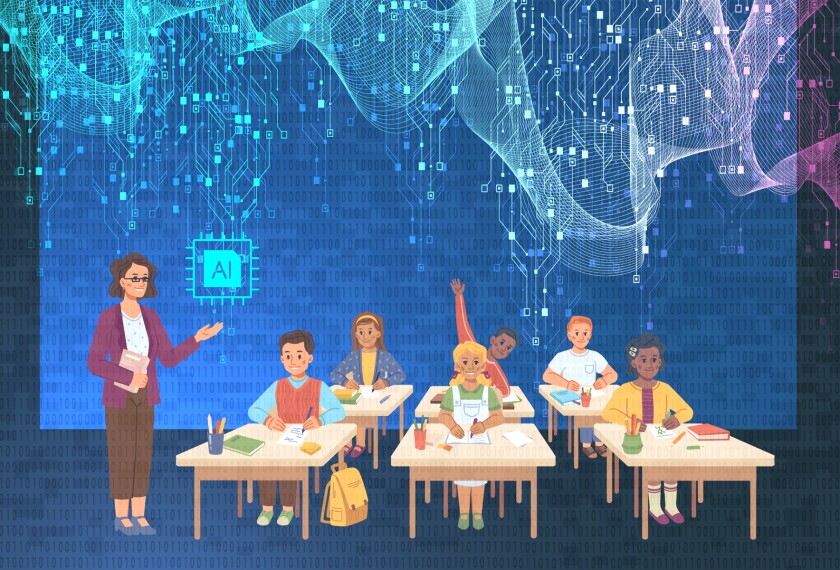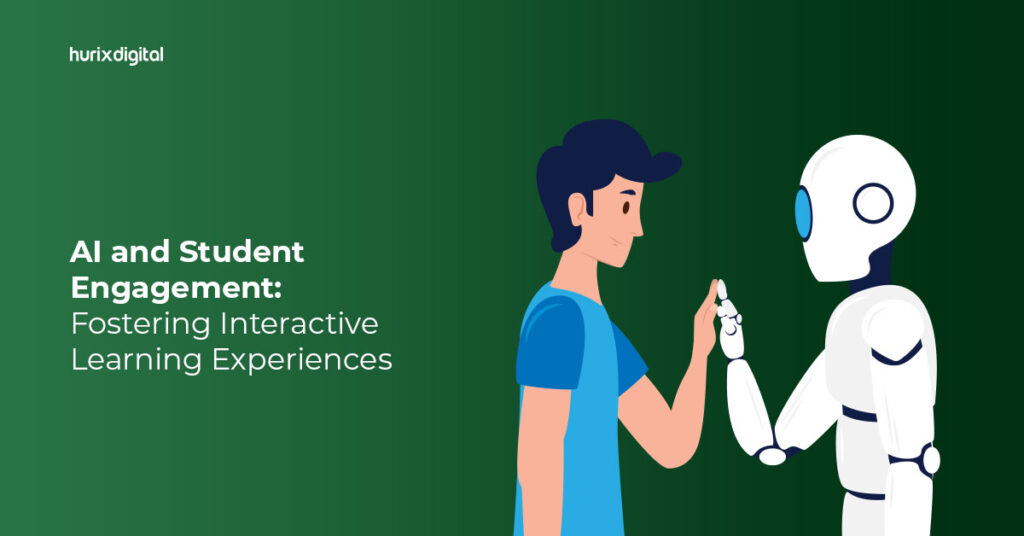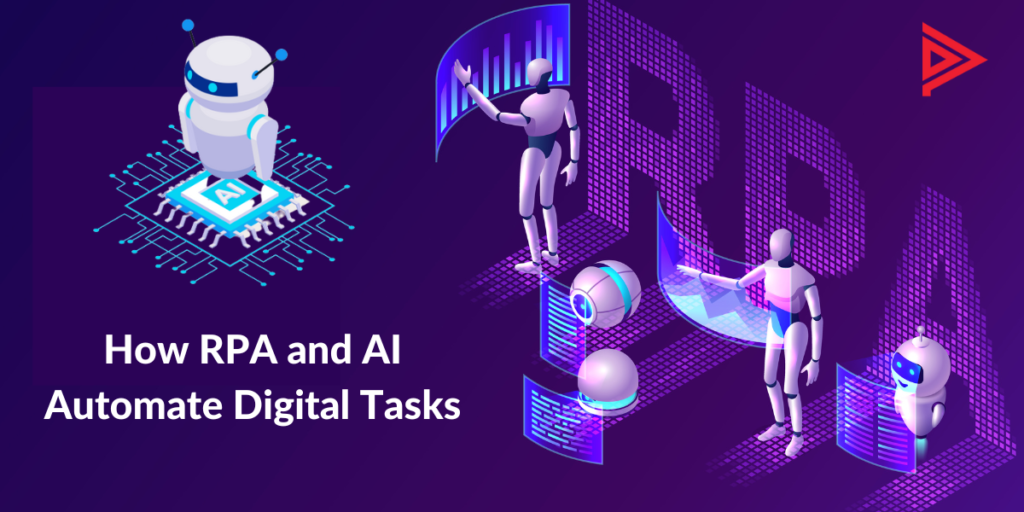AI in schools is transforming learning and teaching techniques rapidly in the education sector.bringing about significant advancements in teaching methodologies, personalized learning, and overall student engagement. Here’s a glimpse into how AI is shaping education[1].
AI in School: Personalized Learning
1. Tailored Instruction
With the use of AI, learning routes may be tailored based on a student’s strengths, limitations, and preferred method of learning. Consider a program that, in response to each student’s unique demands, modifies the level of difficulty, proposes practice problems that are pertinent, or offers focused feedback.
How AI achieves
Artificial Intelligence (AI) plays a crucial role in personalizing education by analyzing student data and creating customized learning paths. Let’s explore how AI achieves this:

- Adaptive Learning:
- AI-powered adaptive learning platforms analyze student performance, strengths, weaknesses, and learning pace.
- Based on this information, the system tailors personalized learning pathways for each student.
- It offers appropriate content, resources, and activities aligned with their specific needs.
- Intelligent Tutoring Systems:
- These systems provide individualized guidance and support to students.
- AI assesses student understanding, identifies areas of difficulty, and offers targeted explanations, feedback, and practice exercises.
- The system adapts to each student’s progress, adjusting the learning material accordingly[3].
- Personalized Recommendations:
- AI algorithms analyze vast amounts of data, including a student’s past performance, interests, and goals.
- This enables the system to generate personalized recommendations for educational resources, such as books, articles, videos, and other learning materials.
- Students discover relevant content that matches their specific needs and preferences[2].
- Natural Language Processing (NLP):
- AI-powered NLP allows for the development of intelligent chatbots and virtual assistants.
- These chatbots can interact with students in a conversational manner, providing support and answering queries[4].
AI’s ability to analyze student data and adapt learning experiences ensures that each student receives tailored support, leading to enhanced engagement and improved learning outcomes. 🌟📚🤖
2. Intelligent Tutors

AI-powered instructors may offer students on-demand assistance, respond to inquiries, and simplify difficult ideas for them. For kids who learn best on their own schedule or who want additional support, this can be especially beneficial.
Indeed! AI-powered tutors are revolutionizing education by offering personalized and timely assistance to students. Let’s delve into how they enhance the learning experience:
- 24/7 Availability:
- AI tutors are available round the clock, providing instant support whenever students need it.
- Whether it’s late at night or during weekends, students can access help without waiting for office hours.
- Individualized Assistance:
- AI tutors tailor their responses to each student’s specific needs.
- They analyze the student’s query, learning history, and context to provide relevant explanations and guidance.
- Concept Clarification:
- When students encounter complex concepts, AI tutors break them down into simpler terms.
- They offer step-by-step explanations, visual aids, and examples to enhance understanding.
- Adaptive Learning Paths:
- AI tutors track student progress and identify areas of strengths and weaknesses.
- Based on this analysis, they recommend additional resources or exercises to reinforce learning.
- Feedback and Assessment:
- AI tutors can grade assignments, provide feedback, and highlight areas for improvement.
- Students receive constructive comments to enhance their skills.
- Language Support:
- AI tutors can communicate in multiple languages, making them accessible to a diverse student population.
- Language barriers are minimized, ensuring effective communication.
- Automated Responses:
- For routine queries, AI tutors can provide automated responses.
- This frees up human educators to focus on more complex interactions and personalized teaching.
Remember, while AI tutors excel in certain areas, the human touch remains essential. A balanced approach that combines AI assistance with teacher-led instruction ensures a holistic and effective learning environment. 🤖📚✨
Enhanced Engagement

1. Interactive Learning Experiences
Learning may be made more enjoyable and engaging by using AI to develop gamified learning experiences. Envision pedagogical games that adjust to a pupil’s advancement, acknowledge comprehension of ideas, and sustain their enthusiasm for learning.
Absolutely! Artificial Intelligence (AI) has the potential to revolutionize learning experiences, making them more enjoyable and engaging. Here’s how:
- Personalized Learning Paths
- AI can customize learning journeys based on individual strengths, weaknesses, and learning styles.
- Students receive content and exercises that resonate with their unique preferences, making learning more enjoyable.
- Interactive Learning:
- AI-powered interactive tools create engaging experiences.
- Chatbots, virtual tutors, and gamified learning platforms keep students motivated and curious.
- Adaptive Content:
- AI analyzes student progress and adjusts the difficulty level of exercises.
- This ensures that students are neither overwhelmed nor bored, maintaining their interest.
- Automated Grading and Feedback:
- AI can automate grading of assignments, quizzes, and tests.
- Instant feedback helps students understand their performance and areas for improvement.
- Exploring Complex Concepts:
- AI can break down complex topics into digestible explanations.
- Visual aids, simulations, and interactive models enhance understanding.
- Language Learning:
- AI-powered language apps offer conversational practice and real-time corrections.
- Learning a new language becomes more enjoyable and interactive.
- Virtual Reality (VR) and Augmented Reality (AR):
- AI-driven VR and AR applications create immersive learning environments.
- Students explore historical sites, scientific phenomena, and artistic masterpieces firsthand.
- Predictive Analytics:
- AI predicts student performance and identifies those at risk of falling behind.
- Early interventions prevent learning gaps and keep students engaged.
- Adaptive Assessments:
- AI adjusts the difficulty of assessments based on student progress.
- Students feel challenged yet supported, enhancing their learning experience.
- Creativity and Exploration:
- AI-generated prompts inspire creative writing, art, and music.
- Students explore new ideas and express themselves in innovative ways.
Incorporating AI into education fosters a dynamic and enjoyable learning environment, preparing students for a future where adaptability and creativity are essential. 🌟🤖📚
2. Immersive Learning

Virtual reality (VR) and augmented reality (AR) driven by artificial intelligence (AI) have the potential to provide immersive learning environments that let students investigate various cultures, historical eras, or scientific ideas in a more engaged manner.
Virtual Reality (VR) and Augmented Reality (AR), powered by Artificial Intelligence (AI):
- Virtual Reality (VR):
- VR immerses users in simulated environments, creating a sense of presence in a digital world.
- It transports users to new realms, whether for gaming, training, therapy, or entertainment.
- AI enhances VR experiences by:
- Adaptive Content: AI adjusts the difficulty of exercises and challenges based on user progress.
- Natural Language Processing (NLP): AI-driven chatbots provide real-time assistance and explanations.
- Predictive Analytics: AI predicts user behavior and optimizes VR interactions.
- Augmented Reality (AR):
- AR overlays digital information onto the real world, enhancing what users see.
- It promotes interaction between digital content and the physical environment.
- AI enriches AR by:
- Personalized Recommendations: AI analyzes user preferences and recommends relevant AR content.
- Computer Vision: AI identifies objects and context in real time, enhancing AR overlays.
- Spatial Mapping: AI helps align digital elements with the user’s surroundings.
- Applications:
- Education: AI-driven AR and VR enhance learning experiences by providing interactive content, simulations, and personalized guidance.
- Healthcare: AI-powered VR assists in medical training, patient rehabilitation, and mental health therapy.
- Business: AI-driven AR improves remote collaboration, maintenance, and visualization.
- Entertainment: AI-enhanced VR gaming offers immersive adventures and realistic simulations.
- Challenges and Future Directions:
- Optical Engineering: AI can optimize near-eye display modules for exceptional visual performance.
- Ergonomics: Lightweight, glasses-like AR and VR designs are essential for user comfort.
- Innovations: Ongoing research will lead to more efficient and user-friendly AR/VR systems.
In summary, the fusion of AI, VR, and AR promises transformative digital experiences, shaping how we perceive and interact with the world. 🌟🤖🔮
Educator Support
1. Automated Tasks

Administrative duties including class scheduling, essay grading, and student record management can be automated by AI. This gives teachers more time to devote to more crucial responsibilities, such lesson planning, giving each student individualized attention, and creating a supportive learning environment.
Artificial Intelligence (AI) is a powerful ally in streamlining administrative tasks within educational institutions. Let’s explore how it can revolutionize administrative processes:
- Automated Essay Grading:
- AI algorithms can evaluate essays based on predefined criteria.
- They analyze content, grammar, coherence, and style, providing consistent and efficient grading.
- Teachers can focus on providing qualitative feedback rather than spending hours on manual grading.
- Class Scheduling and Timetabling:
- AI can optimize class schedules by considering factors like room availability, teacher preferences, and student course loads.
- It minimizes conflicts and ensures efficient use of resources.
- Student Records Management:
- AI systems organize and maintain student records.
- They handle enrollment, attendance, grades, and other essential data.
- Alerts can be generated for missing information or anomalies.
- Chatbots for Student Queries:
- AI-powered chatbots handle routine queries from students, parents, and staff.
- They provide instant responses, reducing the workload on administrative personnel.
- Predictive Analytics for Retention:
- AI analyzes historical data to predict student retention.
- Early identification of at-risk students allows for targeted interventions.
- Financial Aid and Scholarships:
- AI assists in managing financial aid applications and scholarship processes.
- It matches students with relevant funding opportunities.
- Automated Communication:
- AI sends automated notifications to students and parents regarding deadlines, events, and announcements.
- Personalized messages enhance engagement.
- Security and Access Control:
- AI monitors campus security through surveillance systems.
- Facial recognition and anomaly detection enhance safety.
- Resource Allocation:
- AI optimizes resource allocation (e.g., textbooks, equipment, transportation).
- It ensures efficient utilization and cost-effectiveness.
- Data Insights for Decision-Making:
- AI analyzes trends and patterns in data to inform strategic decisions.
- Administrators gain insights into student performance, enrollment trends, and resource needs.
AI-driven administrative processes enhance efficiency, reduce manual labor, and allow educational institutions to focus on their core mission: providing quality education. 🌟🤖📚
2. Data-Driven Insights
AI is capable of analyzing student data to pinpoint problem areas and give teachers information about how well their pupils are learning. With the help of this data, instruction can be modified and more specialized support can be given.
Artificial Intelligence (AI) plays a pivotal role in enhancing education by analyzing student data and providing valuable insights to educators. Here’s how it benefits both students and teachers:
- Early Intervention:
- AI algorithms monitor student performance, identifying areas where they are struggling.
- Teachers receive alerts when a student’s progress deviates from the expected trajectory.
- Early intervention allows targeted support to prevent learning gaps.
- Individualized Learning Paths:
- AI analyzes learning patterns, preferences, and strengths.
- It personalizes learning paths for each student, suggesting appropriate content and activities.
- Students receive tailored resources aligned with their unique needs.
- Learning Analytics:
- AI provides data-driven insights into student behavior and engagement.
- Teachers gain a deeper understanding of how students interact with course materials.
- This informs instructional decisions and curriculum adjustments.
- Automated Grading and Feedback:
- AI automates essay grading, freeing up teachers’ time.
- It provides instant feedback, helping students improve their writing skills.
- Teachers can focus on qualitative feedback and personalized guidance.
- Predictive Analytics:
- AI predicts student outcomes, such as graduation rates or exam performance.
- Educators can allocate resources effectively and implement targeted interventions.
- Adaptive Content Delivery:
- AI adjusts the difficulty level of exercises based on student progress.
- It ensures that students are appropriately challenged, maintaining engagement.
- Behavioral Insights:
- AI analyzes student interaction patterns within digital learning platforms.
- Teachers understand which activities resonate with students and adapt accordingly.
- Feedback Loop:
- AI facilitates a continuous feedback loop between students and teachers.
- Real-time insights allow timely adjustments to teaching strategies.
- Customized Support:
- AI recommends additional resources (videos, articles, quizzes) based on student needs.
- Students receive targeted help beyond the classroom.
- Ethical Considerations:
- Transparency and fairness are crucial. AI systems must avoid bias and protect student privacy.
In summary, AI empowers educators with data-driven insights, enabling them to create more effective and personalized learning experiences. 🌟🤖📚
Challenges and Considerations
- Equity and Access: Unequal access to technology could exacerbate educational inequalities. It’s crucial to ensure everyone has access to AI-powered learning tools to avoid widening the digital divide.
- Teacher Training: Teachers need to be trained on how to effectively use AI tools in the classroom and ensure that AI complements rather than replaces teachers.
- Ethical Considerations: The development and implementation of AI in education needs to be done ethically, with considerations for student privacy, bias in algorithms, and the overall impact on human-teacher interactions.
Overall, AI has the potential to revolutionize education by making it more personalized, engaging, and effective. By harnessing the power of AI responsibly, we can create a future where learning is accessible and enriching for all students.sharemore_vert
Additional Resources
- How AI will impact future education
2. The Role of AI in Personalized Learning[4].
3. Ethical Considerations in AI-powered Education[5].
4. Advancements in Adaptive Learning Platforms[6].
Start Earning Now
Start Earning Now by exploring the vast opportunities AI in education presents for both students and educators alike.